Operations & Project Management: Unilever Analysis & Improvement Plan
VerifiedAdded on 2023/06/08
|19
|5536
|347
Report
AI Summary
This report provides a comprehensive review and critique of operations management principles within Unilever, a multinational consumer goods company. It begins with an introduction to Unilever, highlighting its global presence and key product divisions. The report distinguishes between operation and operations management, emphasizing the latter's role in planning, organization, and resource optimization. It then analyzes Unilever's implementation of operations management principles, focusing on aspects like quality, organization, humility, and success. The extent to which Unilever's operations management meets organizational requirements is assessed, noting improvements in capacity management, cost-effectiveness, and global reach. The report also discusses continuous improvement as a philosophy, describing Lean principles and proposing a continuous improvement plan tailored to Unilever, including recommendations for ongoing enhancement. The report concludes by reiterating the importance of operations and operations management in ensuring the company's overall success.
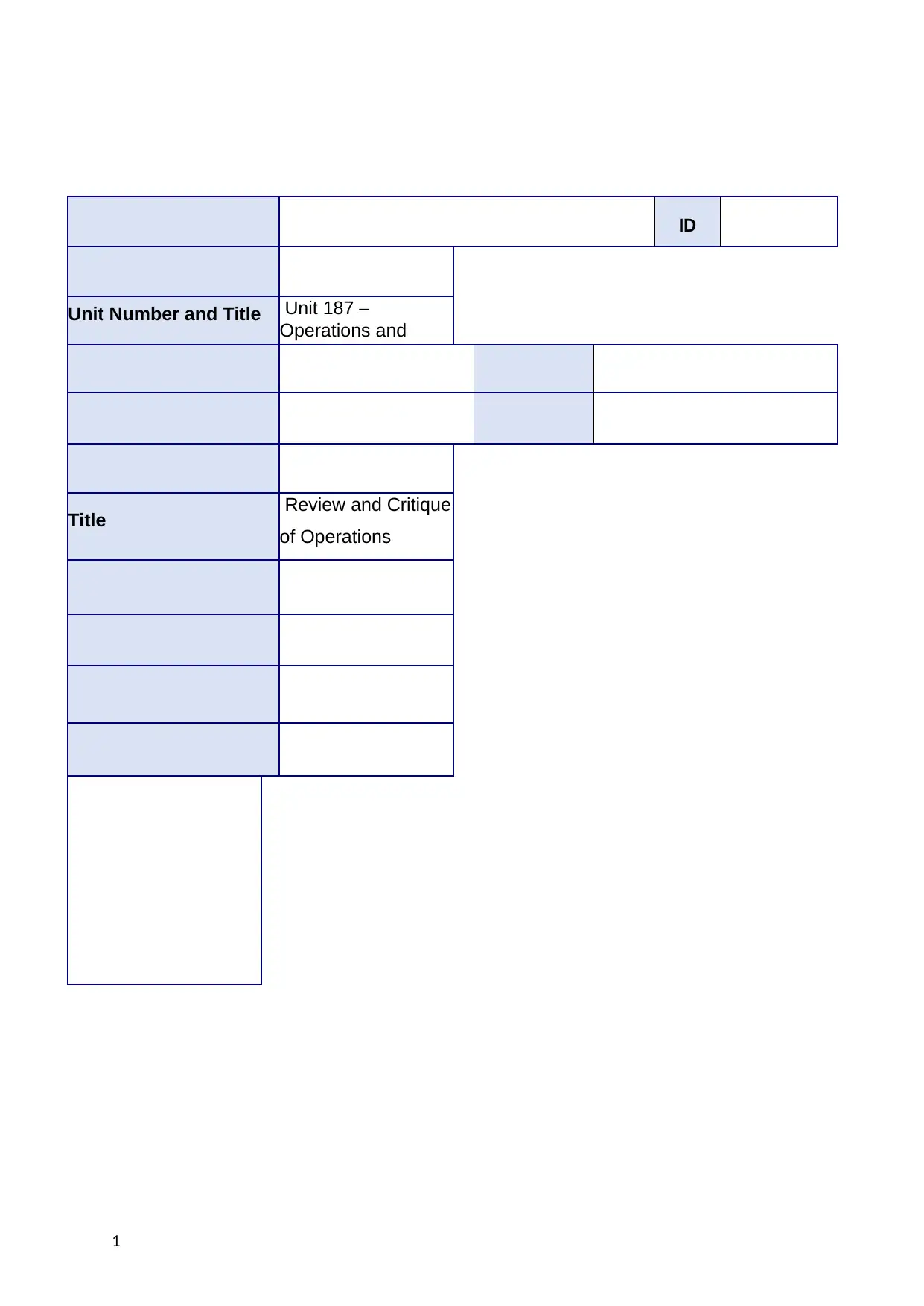
ID
Unit Number and Title Unit 187 –
Operations and
Project Management
Title Review and Critique
of Operations
Management (Part
1
Unit Number and Title Unit 187 –
Operations and
Project Management
Title Review and Critique
of Operations
Management (Part
1
Paraphrase This Document
Need a fresh take? Get an instant paraphrase of this document with our AI Paraphraser

Table of Content
Part 1: Business Report
1. An introduction to chosen organization 3
2. An explanation of operation vs operations management 4
3. A review and critique of the implementation of operations
management principles within the chosen organization 5
4. An analysis of the extent to which the operations management of
the organisation in the case study meets the requirements of the
organization 6
5. Discussion of continuous improvement as a philosophy and
describe the Lean principles 8
6. A continuous improvement plan, including your justified
recommendations for improvement, based on your review and
critique of operations management principles within your
organization 9
7. Conclusion 10
References 11
2
Part 1: Business Report
1. An introduction to chosen organization 3
2. An explanation of operation vs operations management 4
3. A review and critique of the implementation of operations
management principles within the chosen organization 5
4. An analysis of the extent to which the operations management of
the organisation in the case study meets the requirements of the
organization 6
5. Discussion of continuous improvement as a philosophy and
describe the Lean principles 8
6. A continuous improvement plan, including your justified
recommendations for improvement, based on your review and
critique of operations management principles within your
organization 9
7. Conclusion 10
References 11
2
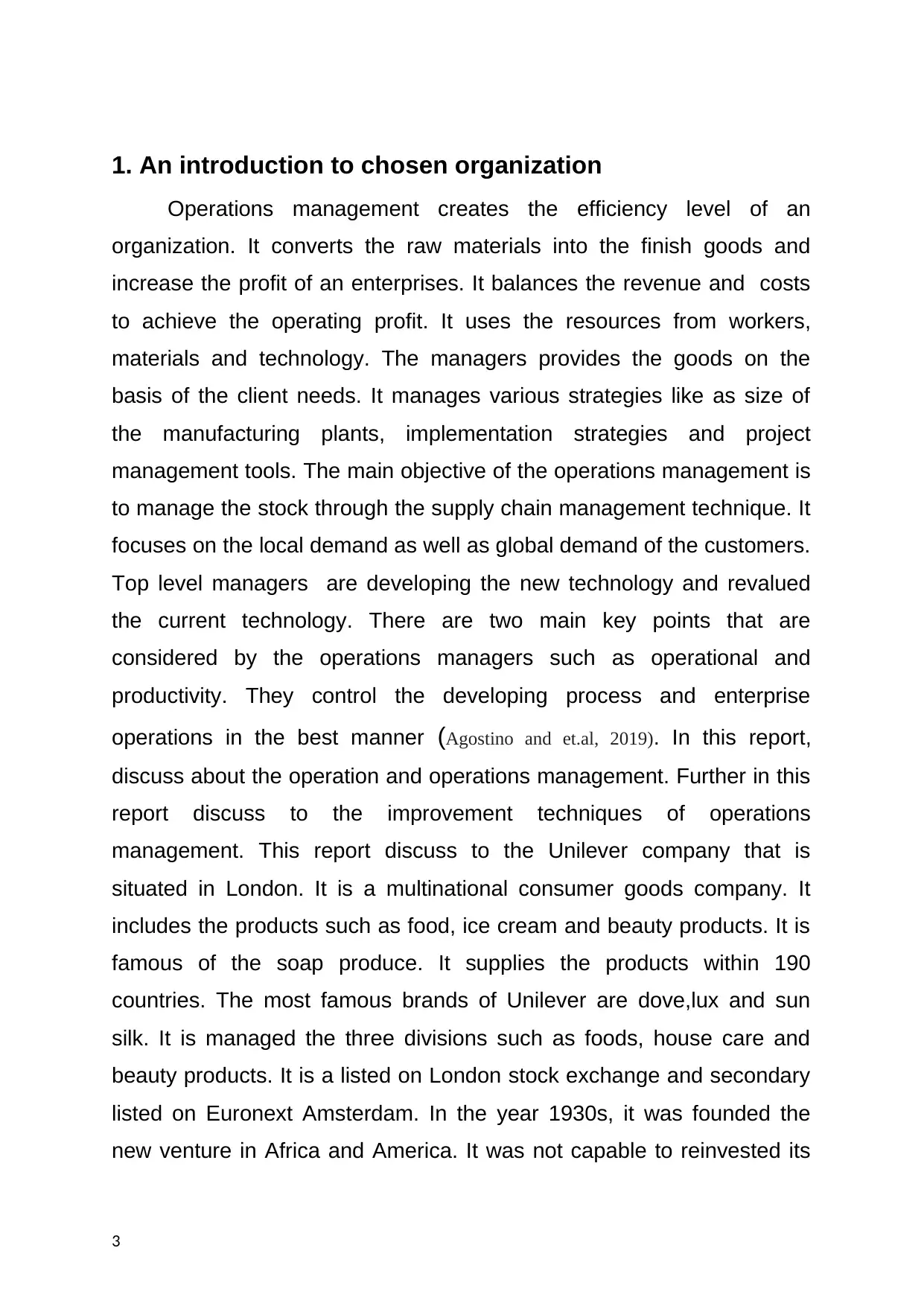
1. An introduction to chosen organization
Operations management creates the efficiency level of an
organization. It converts the raw materials into the finish goods and
increase the profit of an enterprises. It balances the revenue and costs
to achieve the operating profit. It uses the resources from workers,
materials and technology. The managers provides the goods on the
basis of the client needs. It manages various strategies like as size of
the manufacturing plants, implementation strategies and project
management tools. The main objective of the operations management is
to manage the stock through the supply chain management technique. It
focuses on the local demand as well as global demand of the customers.
Top level managers are developing the new technology and revalued
the current technology. There are two main key points that are
considered by the operations managers such as operational and
productivity. They control the developing process and enterprise
operations in the best manner (Agostino and et.al, 2019). In this report,
discuss about the operation and operations management. Further in this
report discuss to the improvement techniques of operations
management. This report discuss to the Unilever company that is
situated in London. It is a multinational consumer goods company. It
includes the products such as food, ice cream and beauty products. It is
famous of the soap produce. It supplies the products within 190
countries. The most famous brands of Unilever are dove,lux and sun
silk. It is managed the three divisions such as foods, house care and
beauty products. It is a listed on London stock exchange and secondary
listed on Euronext Amsterdam. In the year 1930s, it was founded the
new venture in Africa and America. It was not capable to reinvested its
3
Operations management creates the efficiency level of an
organization. It converts the raw materials into the finish goods and
increase the profit of an enterprises. It balances the revenue and costs
to achieve the operating profit. It uses the resources from workers,
materials and technology. The managers provides the goods on the
basis of the client needs. It manages various strategies like as size of
the manufacturing plants, implementation strategies and project
management tools. The main objective of the operations management is
to manage the stock through the supply chain management technique. It
focuses on the local demand as well as global demand of the customers.
Top level managers are developing the new technology and revalued
the current technology. There are two main key points that are
considered by the operations managers such as operational and
productivity. They control the developing process and enterprise
operations in the best manner (Agostino and et.al, 2019). In this report,
discuss about the operation and operations management. Further in this
report discuss to the improvement techniques of operations
management. This report discuss to the Unilever company that is
situated in London. It is a multinational consumer goods company. It
includes the products such as food, ice cream and beauty products. It is
famous of the soap produce. It supplies the products within 190
countries. The most famous brands of Unilever are dove,lux and sun
silk. It is managed the three divisions such as foods, house care and
beauty products. It is a listed on London stock exchange and secondary
listed on Euronext Amsterdam. In the year 1930s, it was founded the
new venture in Africa and America. It was not capable to reinvested its
3
⊘ This is a preview!⊘
Do you want full access?
Subscribe today to unlock all pages.

Trusted by 1+ million students worldwide
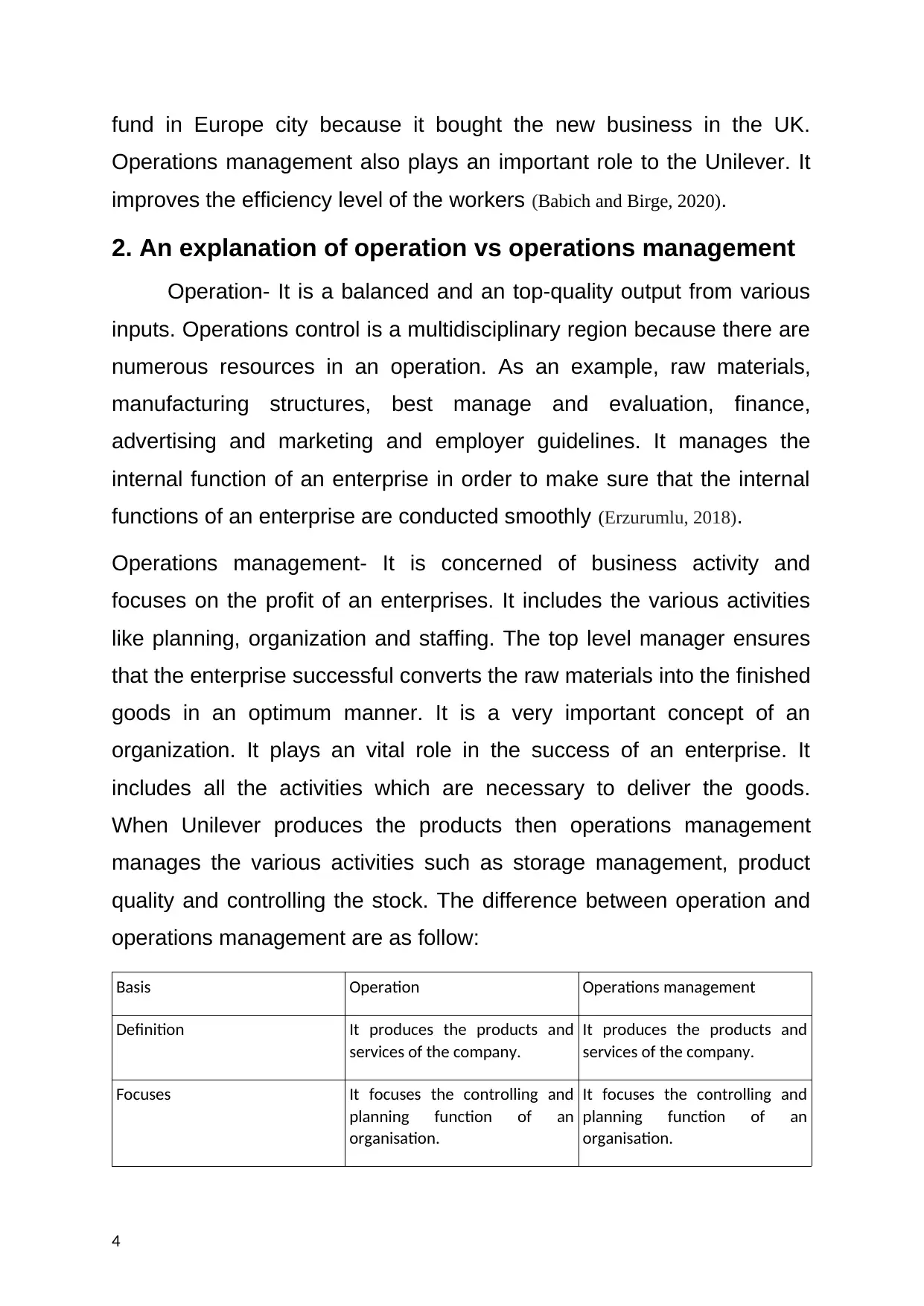
fund in Europe city because it bought the new business in the UK.
Operations management also plays an important role to the Unilever. It
improves the efficiency level of the workers (Babich and Birge, 2020).
2. An explanation of operation vs operations management
Operation- It is a balanced and an top-quality output from various
inputs. Operations control is a multidisciplinary region because there are
numerous resources in an operation. As an example, raw materials,
manufacturing structures, best manage and evaluation, finance,
advertising and marketing and employer guidelines. It manages the
internal function of an enterprise in order to make sure that the internal
functions of an enterprise are conducted smoothly (Erzurumlu, 2018).
Operations management- It is concerned of business activity and
focuses on the profit of an enterprises. It includes the various activities
like planning, organization and staffing. The top level manager ensures
that the enterprise successful converts the raw materials into the finished
goods in an optimum manner. It is a very important concept of an
organization. It plays an vital role in the success of an enterprise. It
includes all the activities which are necessary to deliver the goods.
When Unilever produces the products then operations management
manages the various activities such as storage management, product
quality and controlling the stock. The difference between operation and
operations management are as follow:
Basis Operation Operations management
Definition It produces the products and
services of the company.
It produces the products and
services of the company.
Focuses It focuses the controlling and
planning function of an
organisation.
It focuses the controlling and
planning function of an
organisation.
4
Operations management also plays an important role to the Unilever. It
improves the efficiency level of the workers (Babich and Birge, 2020).
2. An explanation of operation vs operations management
Operation- It is a balanced and an top-quality output from various
inputs. Operations control is a multidisciplinary region because there are
numerous resources in an operation. As an example, raw materials,
manufacturing structures, best manage and evaluation, finance,
advertising and marketing and employer guidelines. It manages the
internal function of an enterprise in order to make sure that the internal
functions of an enterprise are conducted smoothly (Erzurumlu, 2018).
Operations management- It is concerned of business activity and
focuses on the profit of an enterprises. It includes the various activities
like planning, organization and staffing. The top level manager ensures
that the enterprise successful converts the raw materials into the finished
goods in an optimum manner. It is a very important concept of an
organization. It plays an vital role in the success of an enterprise. It
includes all the activities which are necessary to deliver the goods.
When Unilever produces the products then operations management
manages the various activities such as storage management, product
quality and controlling the stock. The difference between operation and
operations management are as follow:
Basis Operation Operations management
Definition It produces the products and
services of the company.
It produces the products and
services of the company.
Focuses It focuses the controlling and
planning function of an
organisation.
It focuses the controlling and
planning function of an
organisation.
4
Paraphrase This Document
Need a fresh take? Get an instant paraphrase of this document with our AI Paraphraser
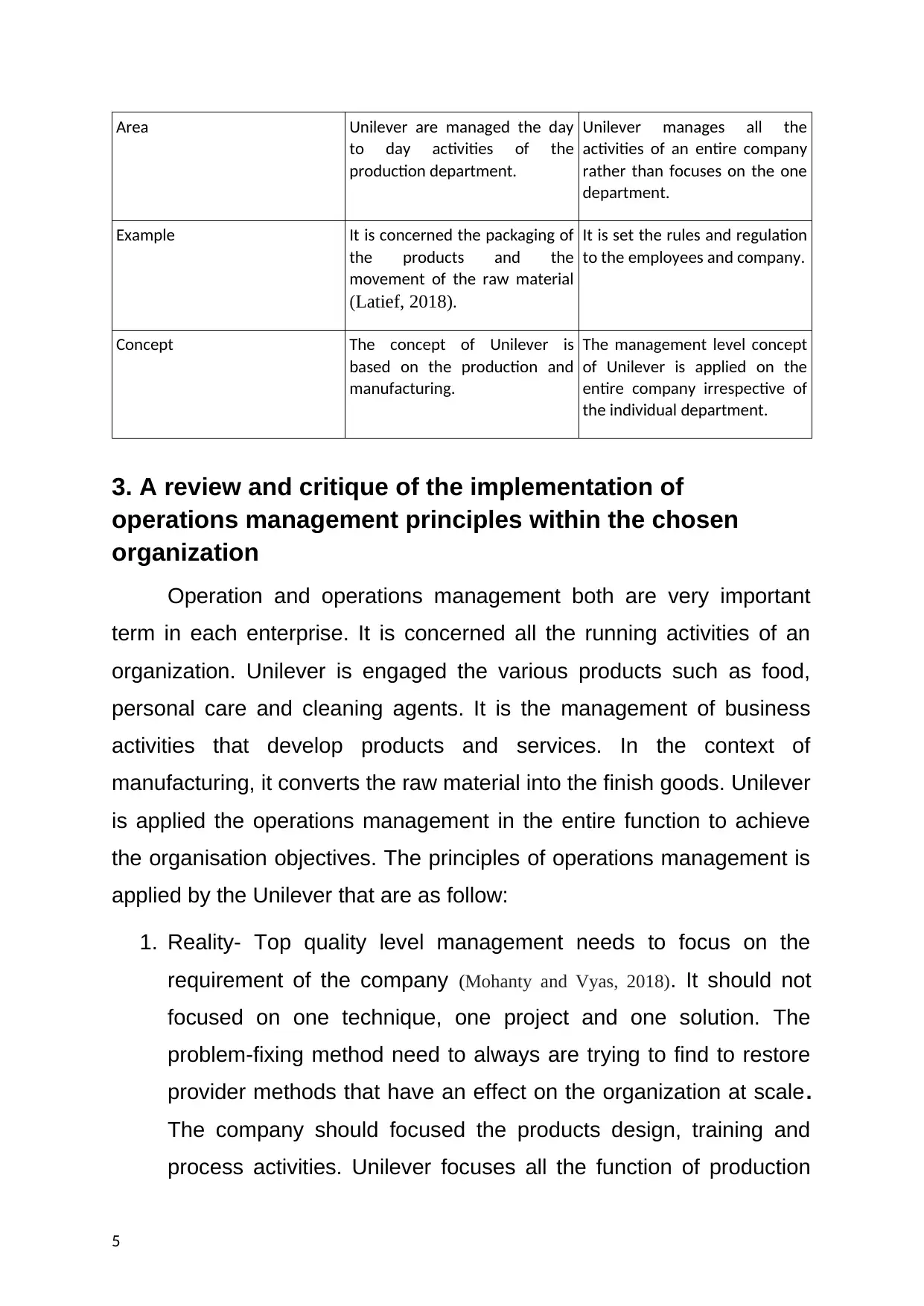
Area Unilever are managed the day
to day activities of the
production department.
Unilever manages all the
activities of an entire company
rather than focuses on the one
department.
Example It is concerned the packaging of
the products and the
movement of the raw material
(Latief, 2018).
It is set the rules and regulation
to the employees and company.
Concept The concept of Unilever is
based on the production and
manufacturing.
The management level concept
of Unilever is applied on the
entire company irrespective of
the individual department.
3. A review and critique of the implementation of
operations management principles within the chosen
organization
Operation and operations management both are very important
term in each enterprise. It is concerned all the running activities of an
organization. Unilever is engaged the various products such as food,
personal care and cleaning agents. It is the management of business
activities that develop products and services. In the context of
manufacturing, it converts the raw material into the finish goods. Unilever
is applied the operations management in the entire function to achieve
the organisation objectives. The principles of operations management is
applied by the Unilever that are as follow:
1. Reality- Top quality level management needs to focus on the
requirement of the company (Mohanty and Vyas, 2018). It should not
focused on one technique, one project and one solution. The
problem-fixing method need to always are trying to find to restore
provider methods that have an effect on the organization at scale.
The company should focused the products design, training and
process activities. Unilever focuses all the function of production
5
to day activities of the
production department.
Unilever manages all the
activities of an entire company
rather than focuses on the one
department.
Example It is concerned the packaging of
the products and the
movement of the raw material
(Latief, 2018).
It is set the rules and regulation
to the employees and company.
Concept The concept of Unilever is
based on the production and
manufacturing.
The management level concept
of Unilever is applied on the
entire company irrespective of
the individual department.
3. A review and critique of the implementation of
operations management principles within the chosen
organization
Operation and operations management both are very important
term in each enterprise. It is concerned all the running activities of an
organization. Unilever is engaged the various products such as food,
personal care and cleaning agents. It is the management of business
activities that develop products and services. In the context of
manufacturing, it converts the raw material into the finish goods. Unilever
is applied the operations management in the entire function to achieve
the organisation objectives. The principles of operations management is
applied by the Unilever that are as follow:
1. Reality- Top quality level management needs to focus on the
requirement of the company (Mohanty and Vyas, 2018). It should not
focused on one technique, one project and one solution. The
problem-fixing method need to always are trying to find to restore
provider methods that have an effect on the organization at scale.
The company should focused the products design, training and
process activities. Unilever focuses all the function of production
5

activities rather than one product. It provides the better services of
their clients (Parkhi, 2019).
2. Organization- It creates the interrelationship of all departments.
The service managers give the guidelines to the technicians. The
service manager should to improve the quality regularly of the
products and services. The quality level mangers to check the
quality regularly and satisfied the customer needs.
3. Humility- It is very difficult process to improving the delivery and
customer satisfaction. It plays an important role in the Unilever. It
identifies the customer needs and provide the better services of
their consumers.
4. Success- The Unilever can survive till long term if they provide the
goods on the basis of consumer needs. If the company wants to
success then it should determined how to develop a consumer
centric field service business (Raut and et.al, 2019).
4. An analysis of the extent to which the operations
management of the organisation in the case study meets
the requirements of the organization
The case study of Unilever is defined the importance of operation
and operations management. Operations management is the most
important area of corporation to provides the high quality of goods and
services of their consumer at reasonable cost. The concept of operations
management will support company to recap their management activities
and also acquire the theoretical and practical knowledge about the
operations concepts. In that days Unilever must to retain in the dynamic
environment where key materials are scarce and opportunities of
6
their clients (Parkhi, 2019).
2. Organization- It creates the interrelationship of all departments.
The service managers give the guidelines to the technicians. The
service manager should to improve the quality regularly of the
products and services. The quality level mangers to check the
quality regularly and satisfied the customer needs.
3. Humility- It is very difficult process to improving the delivery and
customer satisfaction. It plays an important role in the Unilever. It
identifies the customer needs and provide the better services of
their consumers.
4. Success- The Unilever can survive till long term if they provide the
goods on the basis of consumer needs. If the company wants to
success then it should determined how to develop a consumer
centric field service business (Raut and et.al, 2019).
4. An analysis of the extent to which the operations
management of the organisation in the case study meets
the requirements of the organization
The case study of Unilever is defined the importance of operation
and operations management. Operations management is the most
important area of corporation to provides the high quality of goods and
services of their consumer at reasonable cost. The concept of operations
management will support company to recap their management activities
and also acquire the theoretical and practical knowledge about the
operations concepts. In that days Unilever must to retain in the dynamic
environment where key materials are scarce and opportunities of
6
⊘ This is a preview!⊘
Do you want full access?
Subscribe today to unlock all pages.

Trusted by 1+ million students worldwide
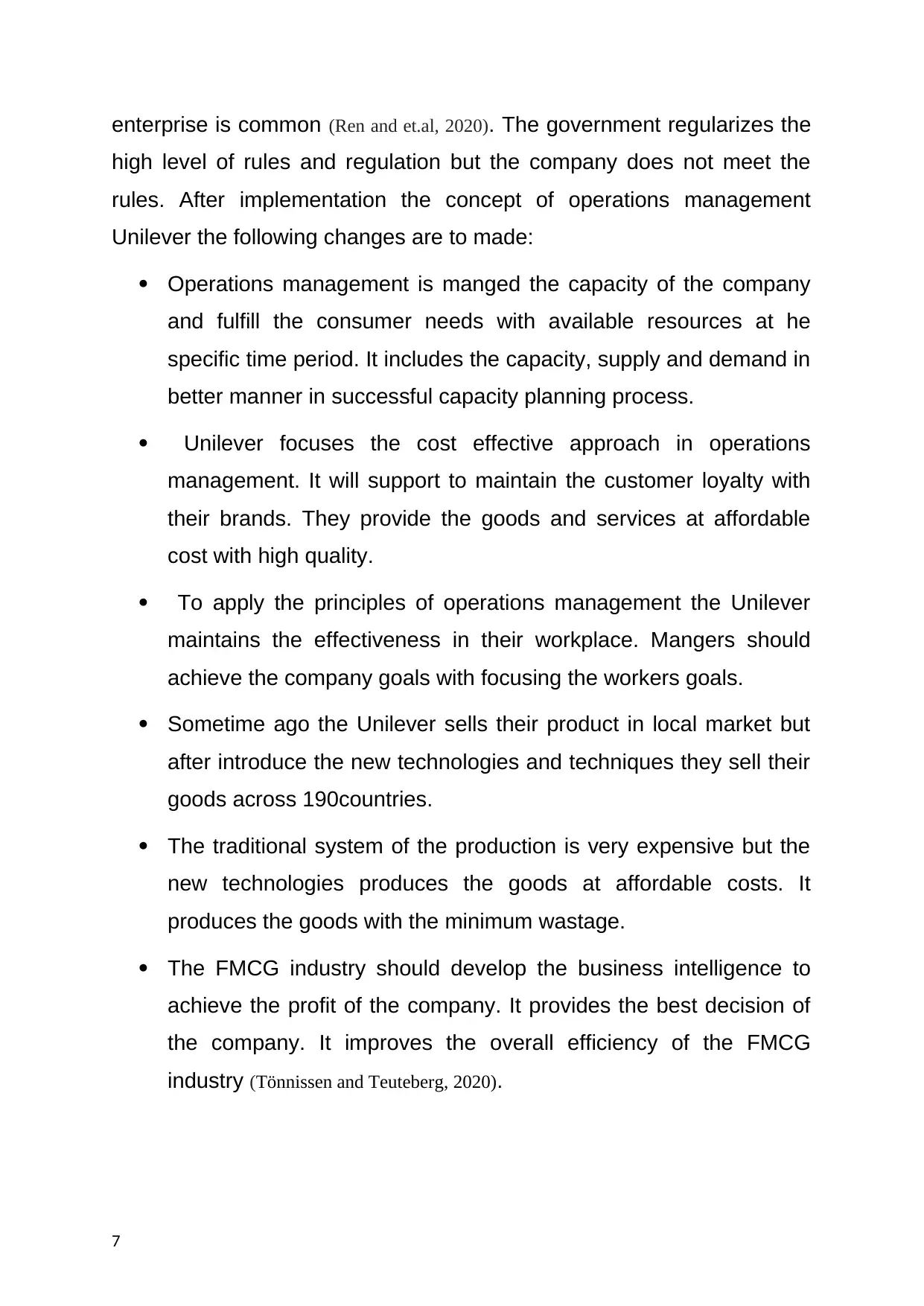
enterprise is common (Ren and et.al, 2020). The government regularizes the
high level of rules and regulation but the company does not meet the
rules. After implementation the concept of operations management
Unilever the following changes are to made:
Operations management is manged the capacity of the company
and fulfill the consumer needs with available resources at he
specific time period. It includes the capacity, supply and demand in
better manner in successful capacity planning process.
Unilever focuses the cost effective approach in operations
management. It will support to maintain the customer loyalty with
their brands. They provide the goods and services at affordable
cost with high quality.
To apply the principles of operations management the Unilever
maintains the effectiveness in their workplace. Mangers should
achieve the company goals with focusing the workers goals.
Sometime ago the Unilever sells their product in local market but
after introduce the new technologies and techniques they sell their
goods across 190countries.
The traditional system of the production is very expensive but the
new technologies produces the goods at affordable costs. It
produces the goods with the minimum wastage.
The FMCG industry should develop the business intelligence to
achieve the profit of the company. It provides the best decision of
the company. It improves the overall efficiency of the FMCG
industry (Tönnissen and Teuteberg, 2020).
7
high level of rules and regulation but the company does not meet the
rules. After implementation the concept of operations management
Unilever the following changes are to made:
Operations management is manged the capacity of the company
and fulfill the consumer needs with available resources at he
specific time period. It includes the capacity, supply and demand in
better manner in successful capacity planning process.
Unilever focuses the cost effective approach in operations
management. It will support to maintain the customer loyalty with
their brands. They provide the goods and services at affordable
cost with high quality.
To apply the principles of operations management the Unilever
maintains the effectiveness in their workplace. Mangers should
achieve the company goals with focusing the workers goals.
Sometime ago the Unilever sells their product in local market but
after introduce the new technologies and techniques they sell their
goods across 190countries.
The traditional system of the production is very expensive but the
new technologies produces the goods at affordable costs. It
produces the goods with the minimum wastage.
The FMCG industry should develop the business intelligence to
achieve the profit of the company. It provides the best decision of
the company. It improves the overall efficiency of the FMCG
industry (Tönnissen and Teuteberg, 2020).
7
Paraphrase This Document
Need a fresh take? Get an instant paraphrase of this document with our AI Paraphraser
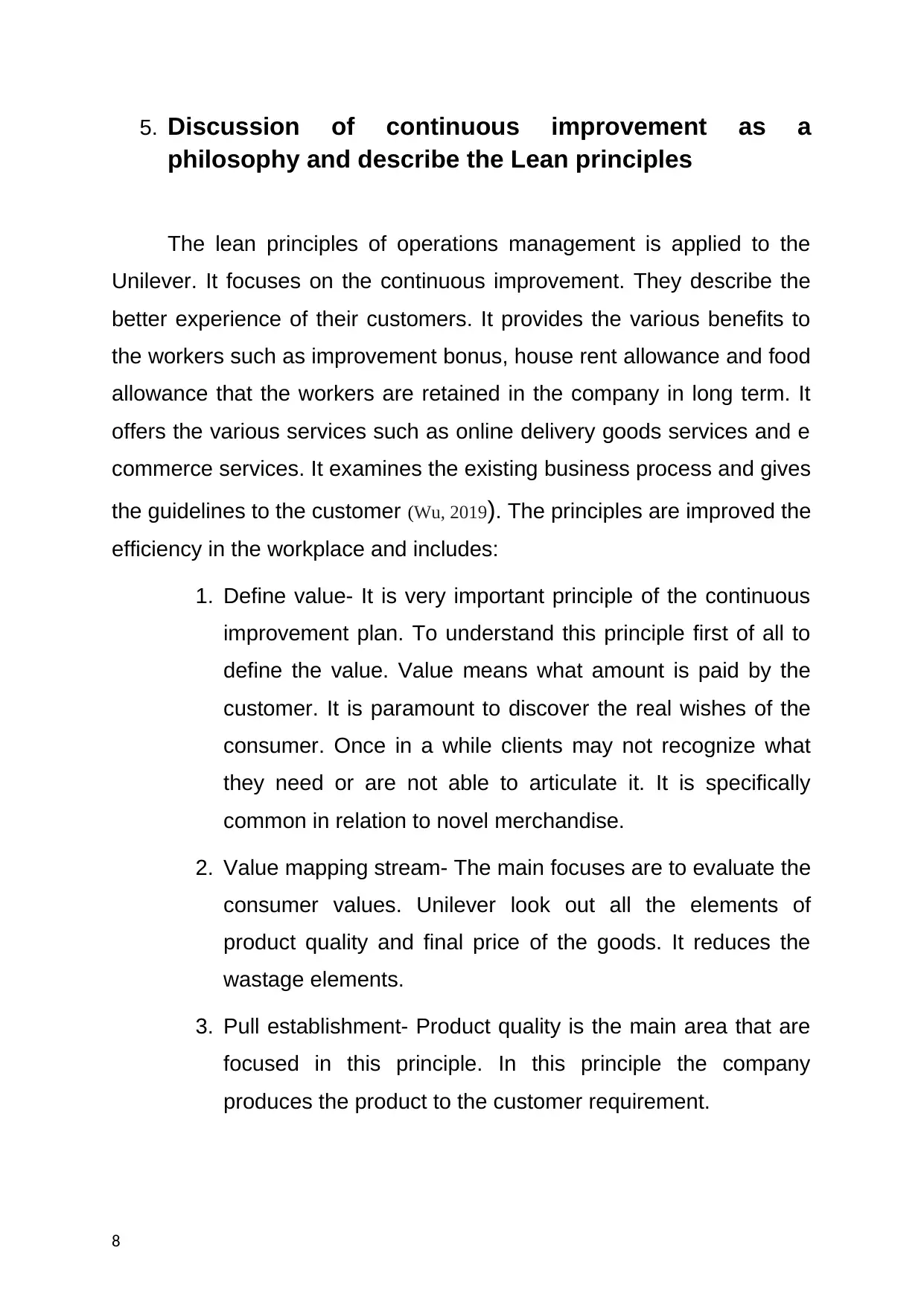
5. Discussion of continuous improvement as a
philosophy and describe the Lean principles
The lean principles of operations management is applied to the
Unilever. It focuses on the continuous improvement. They describe the
better experience of their customers. It provides the various benefits to
the workers such as improvement bonus, house rent allowance and food
allowance that the workers are retained in the company in long term. It
offers the various services such as online delivery goods services and e
commerce services. It examines the existing business process and gives
the guidelines to the customer (Wu, 2019). The principles are improved the
efficiency in the workplace and includes:
1. Define value- It is very important principle of the continuous
improvement plan. To understand this principle first of all to
define the value. Value means what amount is paid by the
customer. It is paramount to discover the real wishes of the
consumer. Once in a while clients may not recognize what
they need or are not able to articulate it. It is specifically
common in relation to novel merchandise.
2. Value mapping stream- The main focuses are to evaluate the
consumer values. Unilever look out all the elements of
product quality and final price of the goods. It reduces the
wastage elements.
3. Pull establishment- Product quality is the main area that are
focused in this principle. In this principle the company
produces the product to the customer requirement.
8
philosophy and describe the Lean principles
The lean principles of operations management is applied to the
Unilever. It focuses on the continuous improvement. They describe the
better experience of their customers. It provides the various benefits to
the workers such as improvement bonus, house rent allowance and food
allowance that the workers are retained in the company in long term. It
offers the various services such as online delivery goods services and e
commerce services. It examines the existing business process and gives
the guidelines to the customer (Wu, 2019). The principles are improved the
efficiency in the workplace and includes:
1. Define value- It is very important principle of the continuous
improvement plan. To understand this principle first of all to
define the value. Value means what amount is paid by the
customer. It is paramount to discover the real wishes of the
consumer. Once in a while clients may not recognize what
they need or are not able to articulate it. It is specifically
common in relation to novel merchandise.
2. Value mapping stream- The main focuses are to evaluate the
consumer values. Unilever look out all the elements of
product quality and final price of the goods. It reduces the
wastage elements.
3. Pull establishment- Product quality is the main area that are
focused in this principle. In this principle the company
produces the product to the customer requirement.
8
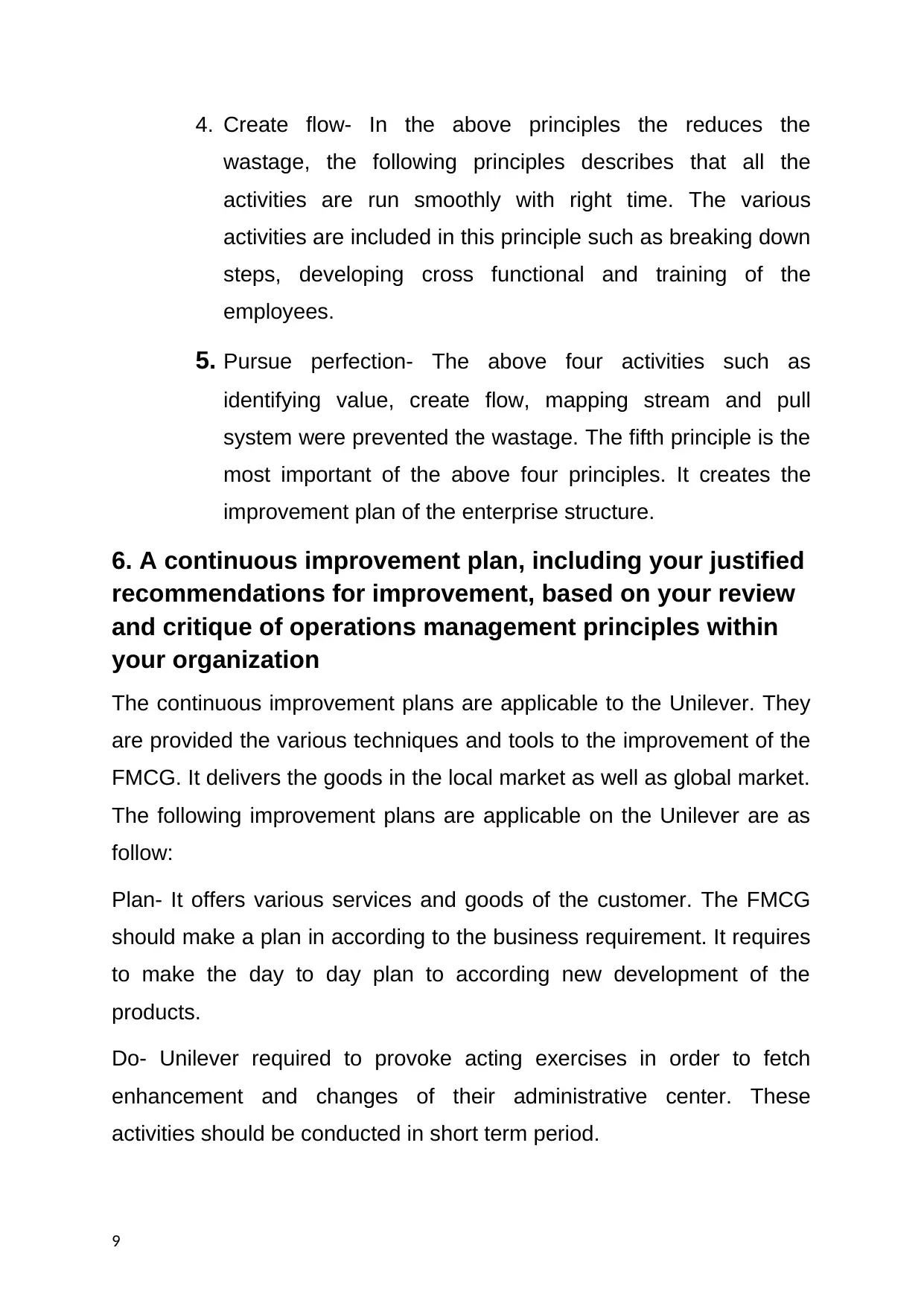
4. Create flow- In the above principles the reduces the
wastage, the following principles describes that all the
activities are run smoothly with right time. The various
activities are included in this principle such as breaking down
steps, developing cross functional and training of the
employees.
5. Pursue perfection- The above four activities such as
identifying value, create flow, mapping stream and pull
system were prevented the wastage. The fifth principle is the
most important of the above four principles. It creates the
improvement plan of the enterprise structure.
6. A continuous improvement plan, including your justified
recommendations for improvement, based on your review
and critique of operations management principles within
your organization
The continuous improvement plans are applicable to the Unilever. They
are provided the various techniques and tools to the improvement of the
FMCG. It delivers the goods in the local market as well as global market.
The following improvement plans are applicable on the Unilever are as
follow:
Plan- It offers various services and goods of the customer. The FMCG
should make a plan in according to the business requirement. It requires
to make the day to day plan to according new development of the
products.
Do- Unilever required to provoke acting exercises in order to fetch
enhancement and changes of their administrative center. These
activities should be conducted in short term period.
9
wastage, the following principles describes that all the
activities are run smoothly with right time. The various
activities are included in this principle such as breaking down
steps, developing cross functional and training of the
employees.
5. Pursue perfection- The above four activities such as
identifying value, create flow, mapping stream and pull
system were prevented the wastage. The fifth principle is the
most important of the above four principles. It creates the
improvement plan of the enterprise structure.
6. A continuous improvement plan, including your justified
recommendations for improvement, based on your review
and critique of operations management principles within
your organization
The continuous improvement plans are applicable to the Unilever. They
are provided the various techniques and tools to the improvement of the
FMCG. It delivers the goods in the local market as well as global market.
The following improvement plans are applicable on the Unilever are as
follow:
Plan- It offers various services and goods of the customer. The FMCG
should make a plan in according to the business requirement. It requires
to make the day to day plan to according new development of the
products.
Do- Unilever required to provoke acting exercises in order to fetch
enhancement and changes of their administrative center. These
activities should be conducted in short term period.
9
⊘ This is a preview!⊘
Do you want full access?
Subscribe today to unlock all pages.

Trusted by 1+ million students worldwide
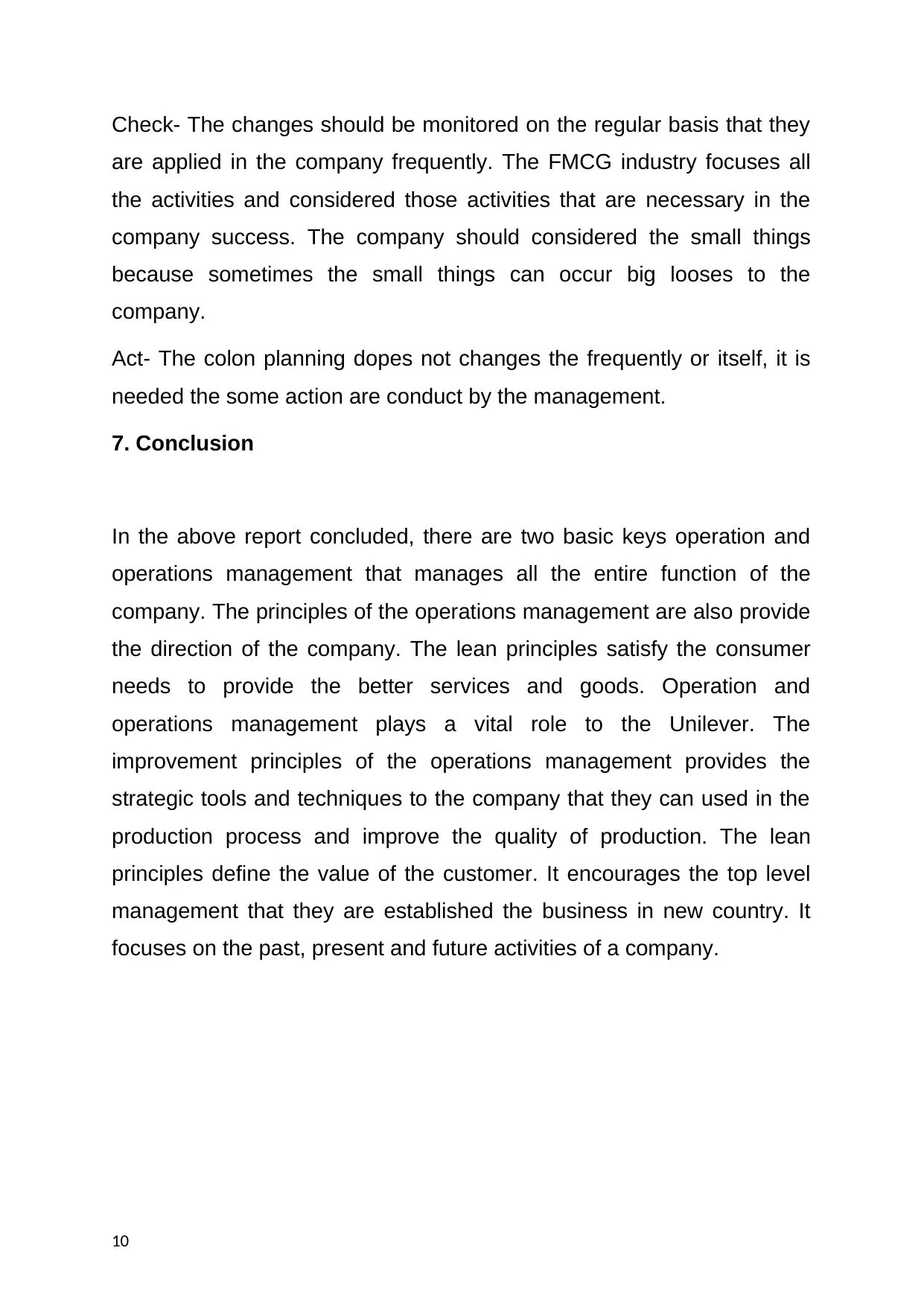
Check- The changes should be monitored on the regular basis that they
are applied in the company frequently. The FMCG industry focuses all
the activities and considered those activities that are necessary in the
company success. The company should considered the small things
because sometimes the small things can occur big looses to the
company.
Act- The colon planning dopes not changes the frequently or itself, it is
needed the some action are conduct by the management.
7. Conclusion
In the above report concluded, there are two basic keys operation and
operations management that manages all the entire function of the
company. The principles of the operations management are also provide
the direction of the company. The lean principles satisfy the consumer
needs to provide the better services and goods. Operation and
operations management plays a vital role to the Unilever. The
improvement principles of the operations management provides the
strategic tools and techniques to the company that they can used in the
production process and improve the quality of production. The lean
principles define the value of the customer. It encourages the top level
management that they are established the business in new country. It
focuses on the past, present and future activities of a company.
10
are applied in the company frequently. The FMCG industry focuses all
the activities and considered those activities that are necessary in the
company success. The company should considered the small things
because sometimes the small things can occur big looses to the
company.
Act- The colon planning dopes not changes the frequently or itself, it is
needed the some action are conduct by the management.
7. Conclusion
In the above report concluded, there are two basic keys operation and
operations management that manages all the entire function of the
company. The principles of the operations management are also provide
the direction of the company. The lean principles satisfy the consumer
needs to provide the better services and goods. Operation and
operations management plays a vital role to the Unilever. The
improvement principles of the operations management provides the
strategic tools and techniques to the company that they can used in the
production process and improve the quality of production. The lean
principles define the value of the customer. It encourages the top level
management that they are established the business in new country. It
focuses on the past, present and future activities of a company.
10
Paraphrase This Document
Need a fresh take? Get an instant paraphrase of this document with our AI Paraphraser
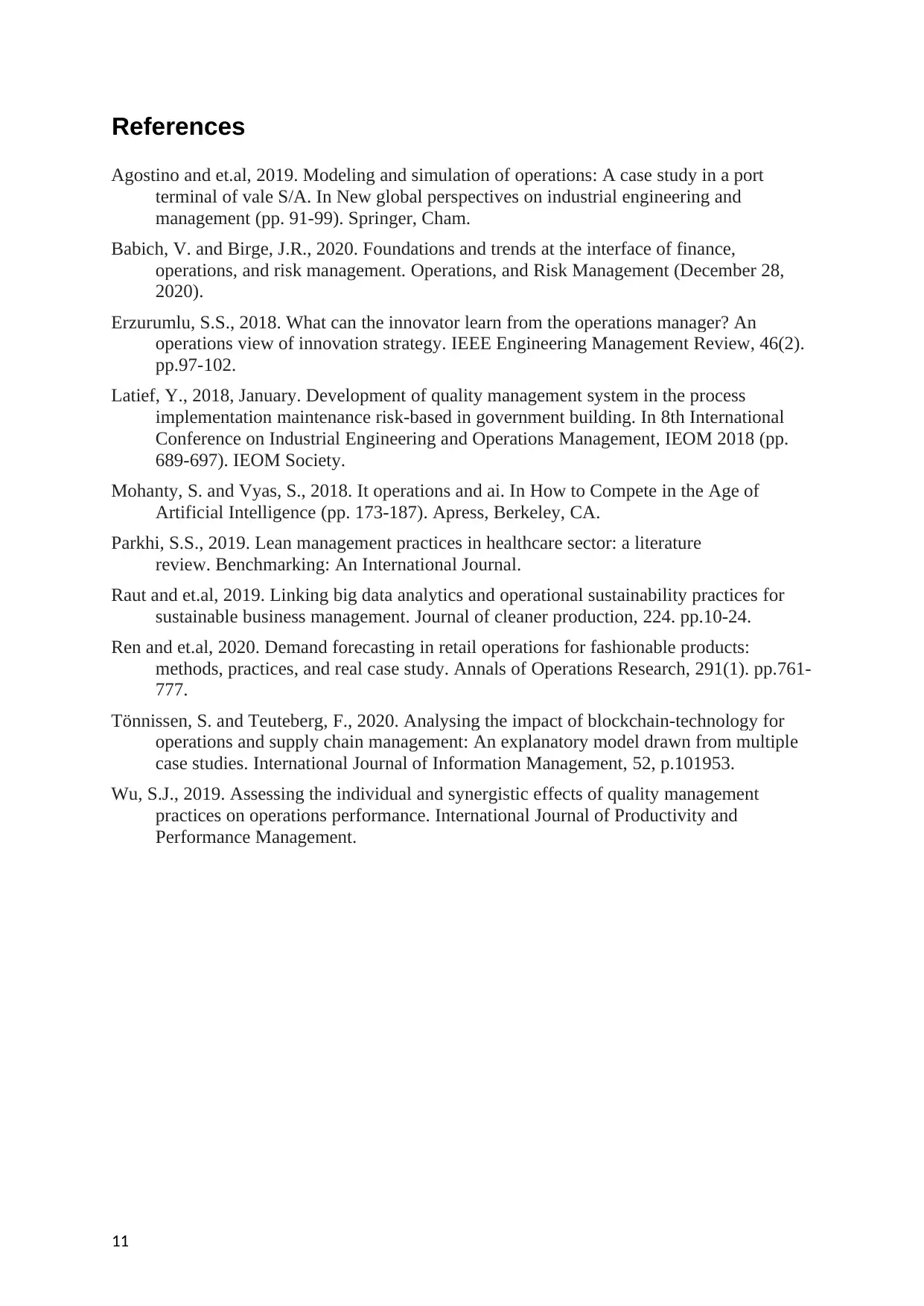
References
Agostino and et.al, 2019. Modeling and simulation of operations: A case study in a port
terminal of vale S/A. In New global perspectives on industrial engineering and
management (pp. 91-99). Springer, Cham.
Babich, V. and Birge, J.R., 2020. Foundations and trends at the interface of finance,
operations, and risk management. Operations, and Risk Management (December 28,
2020).
Erzurumlu, S.S., 2018. What can the innovator learn from the operations manager? An
operations view of innovation strategy. IEEE Engineering Management Review, 46(2).
pp.97-102.
Latief, Y., 2018, January. Development of quality management system in the process
implementation maintenance risk-based in government building. In 8th International
Conference on Industrial Engineering and Operations Management, IEOM 2018 (pp.
689-697). IEOM Society.
Mohanty, S. and Vyas, S., 2018. It operations and ai. In How to Compete in the Age of
Artificial Intelligence (pp. 173-187). Apress, Berkeley, CA.
Parkhi, S.S., 2019. Lean management practices in healthcare sector: a literature
review. Benchmarking: An International Journal.
Raut and et.al, 2019. Linking big data analytics and operational sustainability practices for
sustainable business management. Journal of cleaner production, 224. pp.10-24.
Ren and et.al, 2020. Demand forecasting in retail operations for fashionable products:
methods, practices, and real case study. Annals of Operations Research, 291(1). pp.761-
777.
Tönnissen, S. and Teuteberg, F., 2020. Analysing the impact of blockchain-technology for
operations and supply chain management: An explanatory model drawn from multiple
case studies. International Journal of Information Management, 52, p.101953.
Wu, S.J., 2019. Assessing the individual and synergistic effects of quality management
practices on operations performance. International Journal of Productivity and
Performance Management.
11
Agostino and et.al, 2019. Modeling and simulation of operations: A case study in a port
terminal of vale S/A. In New global perspectives on industrial engineering and
management (pp. 91-99). Springer, Cham.
Babich, V. and Birge, J.R., 2020. Foundations and trends at the interface of finance,
operations, and risk management. Operations, and Risk Management (December 28,
2020).
Erzurumlu, S.S., 2018. What can the innovator learn from the operations manager? An
operations view of innovation strategy. IEEE Engineering Management Review, 46(2).
pp.97-102.
Latief, Y., 2018, January. Development of quality management system in the process
implementation maintenance risk-based in government building. In 8th International
Conference on Industrial Engineering and Operations Management, IEOM 2018 (pp.
689-697). IEOM Society.
Mohanty, S. and Vyas, S., 2018. It operations and ai. In How to Compete in the Age of
Artificial Intelligence (pp. 173-187). Apress, Berkeley, CA.
Parkhi, S.S., 2019. Lean management practices in healthcare sector: a literature
review. Benchmarking: An International Journal.
Raut and et.al, 2019. Linking big data analytics and operational sustainability practices for
sustainable business management. Journal of cleaner production, 224. pp.10-24.
Ren and et.al, 2020. Demand forecasting in retail operations for fashionable products:
methods, practices, and real case study. Annals of Operations Research, 291(1). pp.761-
777.
Tönnissen, S. and Teuteberg, F., 2020. Analysing the impact of blockchain-technology for
operations and supply chain management: An explanatory model drawn from multiple
case studies. International Journal of Information Management, 52, p.101953.
Wu, S.J., 2019. Assessing the individual and synergistic effects of quality management
practices on operations performance. International Journal of Productivity and
Performance Management.
11
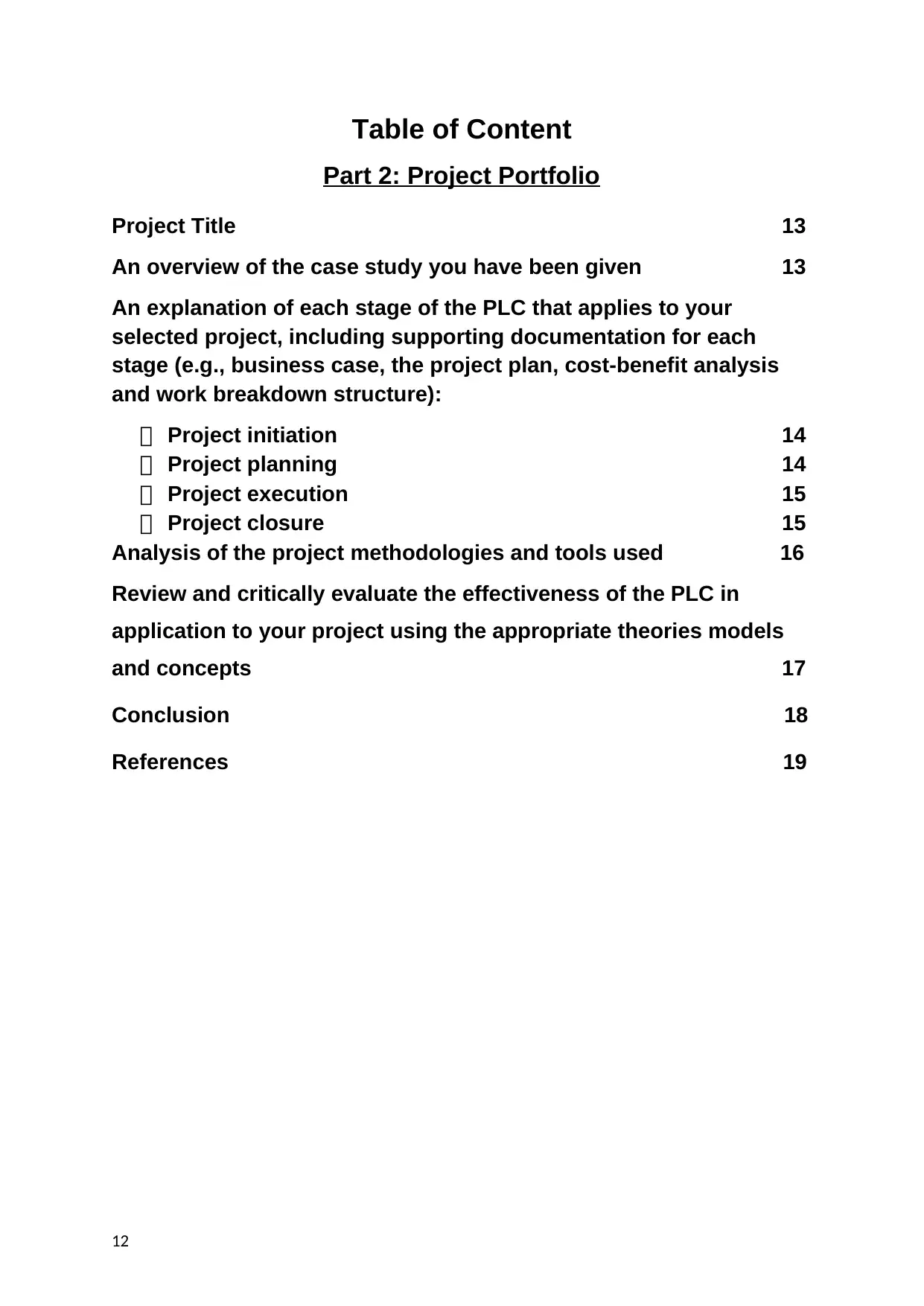
Table of Content
Part 2: Project Portfolio
Project Title 13
An overview of the case study you have been given 13
An explanation of each stage of the PLC that applies to your
selected project, including supporting documentation for each
stage (e.g., business case, the project plan, cost-benefit analysis
and work breakdown structure):
Project initiation 14
Project planning 14
Project execution 15
Project closure 15
Analysis of the project methodologies and tools used 16
Review and critically evaluate the effectiveness of the PLC in
application to your project using the appropriate theories models
and concepts 17
Conclusion 18
References 19
12
Part 2: Project Portfolio
Project Title 13
An overview of the case study you have been given 13
An explanation of each stage of the PLC that applies to your
selected project, including supporting documentation for each
stage (e.g., business case, the project plan, cost-benefit analysis
and work breakdown structure):
Project initiation 14
Project planning 14
Project execution 15
Project closure 15
Analysis of the project methodologies and tools used 16
Review and critically evaluate the effectiveness of the PLC in
application to your project using the appropriate theories models
and concepts 17
Conclusion 18
References 19
12
⊘ This is a preview!⊘
Do you want full access?
Subscribe today to unlock all pages.

Trusted by 1+ million students worldwide
1 out of 19
Related Documents
Your All-in-One AI-Powered Toolkit for Academic Success.
+13062052269
info@desklib.com
Available 24*7 on WhatsApp / Email
![[object Object]](/_next/static/media/star-bottom.7253800d.svg)
Unlock your academic potential
Copyright © 2020–2026 A2Z Services. All Rights Reserved. Developed and managed by ZUCOL.


